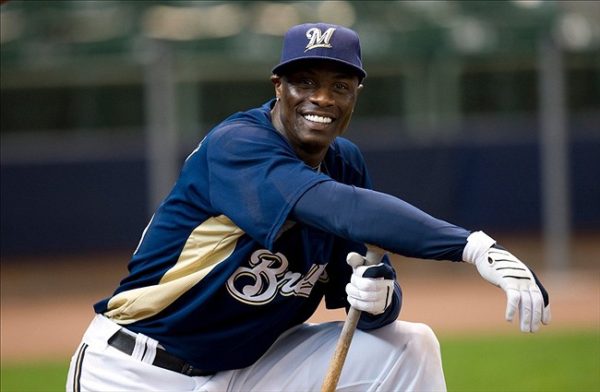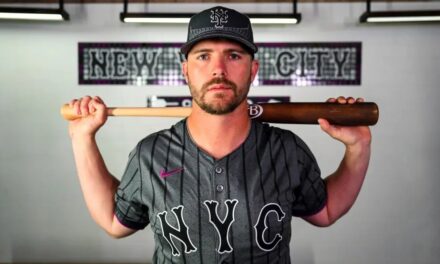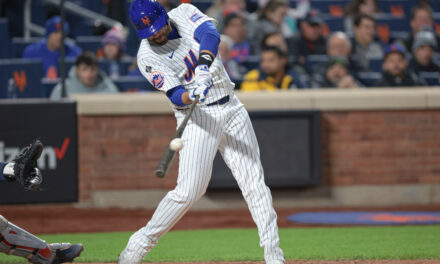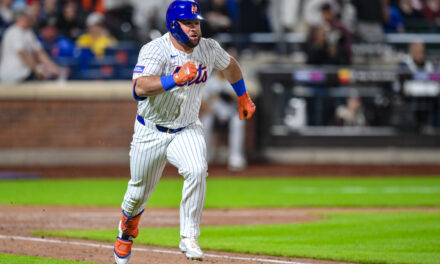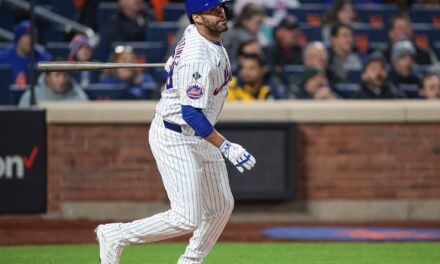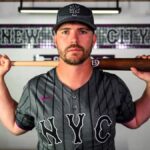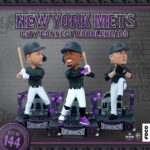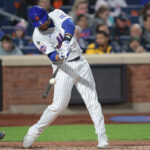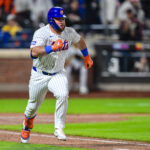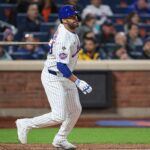Ask the former Gold Glove center fielder Mike Cameron how he looks back on his 17-year career in the majors and he’ll tell you that he feels blessed and grateful.
Those words perfectly describe a man who had the opportunity to play close to 2,000 games in the big leagues, swat 278 career home runs, steal 297 bases, earn three Gold Glove Awards and collect endless memories with the eight different franchises he played for.
Among all qualified center fielders from 1997 (his rookie year) to 2009 (his last season playing over 100 games), Cameron ranked fifth in home runs (264), fifth in RBIs (924), fourth in runs scored (1008), fourth in fWAR (50.8) and third in stolen bases (296).
The combination of speed and power puts Cameron in a rarefied group: He’s one of only 13 outfielders (min. 75 percent played in the outfield) in major league history with at least 250 career home runs and 250 stolen bases. Some of the luminaries in this category are Barry Bonds, Willie Mays, and Andre Dawson.
To many, the highlight reel catches Cameron would make routinely at the center-field wall stood out from his career. Winner of three Gold Gloves (2001, 2003, 2006), Cameron was among the top performers in center during that same stretch of 1997-09, placing first in putouts (4481), second in Total Zone (61), third in UZR (45.8) and seventh in assists (67).
Cameron signed with the New York Mets in the 2003 offseason, fresh off his fifth straight double-digit home run season and earning his second Gold Glove Award.
The slugging center fielder hit a career-best 30 homers for the Mets in 2004, leading the Mets that year in home runs, runs batted in (76), stolen bases (22), runs (76), games played (140), and total bases (236).
I had the privilege of speaking with Cameron last week to discuss his impressive career, tenure with the Mets and his general thoughts about the game today.
MMO: What has life been like for you post-retirement? I read that you have your own baseball academy?
Mike: When I first got out, my oldest son was just starting high school and now he’s kind of on his own. I just wanted to, not get away from the game, but I needed to step away from the game for a while and just live with family. It’s hard enough as it is already, but just being in tune with their life and not about mine, so to speak, and just kind of going with it like that. Just trying to be a dad, just a regular old dad, you know?
I only have one kid that plays baseball, and baseball is still a heavy devotion in my life. That’s the reason why I got the baseball [academy]. It started out with a couple of cages and turned into something massive than I had really looked for, so I became kind of instantaneously part of the community by just putting something together like that.
MMO: You mentioned your son who plays baseball. Daz Cameron was taken in the first round by the Houston Astros in the 2015 Draft. What’s it been like getting to watch your son play professionally now? It must be pretty cool that he’s also playing your old position.
Mike: Yeah, it’s cool. He’s kind of just doing his own thing. We have a lot of similarities and features and I try to enforce a little bit more of the things that I felt like we’re a little bit different type of players. He has this really good knack for controlling the barrel, a lot more than maybe I should have. I should have that same thing.
One thing, if I could regret [something], is coming into this power thing where you sacrifice so many swings and misses for power, when you don’t really have to. He has this really good knack for putting the bat on the ball and even more so than me if I was envious of anything he does very well.
He’s got a good feel for the game and he’s just learning, he’s learning Minor League Baseball. He’s just trying to put it all together. And that’s it, that’s all I can do. I told him I’ve given him all the ingredients. We talk and I get a chance to see the games because he’s in the Midwest League, so I see him on the computer. I can instantly see what’s going on and correct whatever it may be but I can’t do it every day because I need for him to feel it. I need him to understand where I need him to be able to communicate those types of things. I can enhance his learning process a lot better, so it’s instantaneously.
But it’s good, he’s got me and I know everything inside/out about the game. So wherever he is, you spend twenty-one years and I spent years in the minor leagues so I know everything; there’s nothing that I don’t know about playing this part of the game.
He’s kind of got his own thing and I’ve stepped back to allow him to have his own thing. He’s got enough pressure, he’s got my last name. I played for a long time and I was pretty good. And he’s a first-round draft pick so there are so many things in the game of baseball and in his situation that could be negative energy towards him, and I try to stay away from that.
I stay away from all negativity with him, except giving him the simple basics of what he needs to do playing the game. Understanding there’s going to be failure, there’s no one that can get past the failure of the game of baseball, so just live it, man. Live it. Get engaged with it and do your thing.
MMO: Growing up, who were some of your favorite players?
Mike: I got a chance to see those Monday night games, I saw a lot of the Braves. I saw a lot of the Cincinnati Reds. I saw Rickey Henderson a lot, and almost to a fault Ken Griffey Jr.
Modeling my game after one specific player, I used to like Devon White, Rickey Henderson; I liked everybody. I liked all those guys in center field.
Eric Davis was probably my favorite because I resembled the way he played the game. But there are so many dynamics that you learn. Devon White, I feel like I played center field like Devon White. You just copy a lot of different guys.
I kind of learned the game from my uncles and growing up playing softball at a young age with my dad, I just had so much. My grandma was a big fan of the game so I’ve had it easy, I’ve had that support system. Where I grew up at, that was just small town, so everybody knew everybody that did something like this right here. It was good for me.
MMO: Did you primarily play in the outfield when you were growing up?
Mike: I didn’t start playing outfield until I was in my sophomore year of high school. I was a shortstop.
MMO: No kidding? Did you like playing short?
Mike: I loved shortstop! I always had aspirations to play one inning in the big leagues at shortstop. I used to try to get Lou Piniella to let me do it all the time. I took ground balls at short every single day. And not just messing around but to ensure and work on the simple basics and those things like that. It’s a different type of work on the infield, you have to get down so I try to use those things as a stepping stone.
Jerry Manuel was one of the guys who always used to let us do that because he thought we got a chance to see a different side of the game from that dirt as opposed to the outfield. There are so many things that I learned. Joe Nossek, when I first came up with the Chicago White Sox, was inspirational every day in getting me prepared to be an everyday centerfielder.
Gary Pettis was probably the reason why I got the Gold Gloves I have, and Johnny Moses. I had Pettis in the minor leagues. I was just fortunate to have all these guys that were pieces of my puzzle, that kind of put me together. Especially early on at a young age in the minor leagues and everything else.
I can’t be anything but grateful for all the people that do that. In return, I try to share those same sentiments with kids and everybody else playing the game now.
MMO: You were known throughout the game as a tremendous defensive center fielder during your career. Is that something you took pride in and embraced?
Mike: Yeah, I had a good feeling. Darren Lewis used to tell me, and I’m pretty sure everyone else, if you’re playing the middle of the diamond then your main priority is to be a difference-maker on the field. I tried to change the game. I probably didn’t get the same kind of kickback as Andruw Jones or so to speak even Torii [Hunter].
I managed my own weight; I could play that and other positions better than 90 percent of the dudes that play out there. It wasn’t anything like a weakness, I didn’t have a weakness in the outfield. I had a strong arm, I could go back, I could come in, I could play above the fence, I could play around the fence. I learned the nuances of the game like that. There wasn’t any dynamic that I didn’t take into consideration when I played the game out on the field.
I’m grateful for the opportunity I got out there. I figured that they told me if you can play this game in the field and do something then it’ll give you more at-bats to stay in the lineup. Anything can happen on any given day even when you’re struggling, I’ve always looked at it like that.
I mean, before I hit the four homers (May 2, 2002, against the Chicago White Sox), I had been struggling a little bit towards the end of April. That day in Chicago I hit four homers and robbed a grand slam. Nobody ever talks about that, I robbed a grand slam! [Laughs.]
MMO: That’s right, I remember that! But of course, the homers are the most talked about.
Mike: It’s special. All of those things are things I’ll never forget. Obviously, I’ve had way more great days in the field than at the plate, but I’ve had some good days at the plate, so it kind of balances out. I just knew that my game in center field is up there with some of the best and so I can’t even complain one bit.
MMO: What would you rather have: a walk-off home run or to rob a guy of a home run to end a game?
Mike: I’ve got to go with the homer because it’s so hard to hit homers! It’s so hard to hit homers, I loved robbing them, but it’s so hard to hit a home run, man.
The best guys only put a good swing on the ball 40 times, that’s how difficult it is. That’s the kind of game it is. If we think about it in simplest forms, if you hit 20 homers you got to hit 20 balls on the screws very well to get it in the air. You’ve got to hit 30 of them, you try to hit 30 balls out of 700 and something at-bats, you’re trying to hit 30 of them on the screws very well.
That type of mindset simplifies a lot of different things, so you start to square the ball up and God-given ability allows you to get the ball out of the ballpark. I’m trying to teach my kid that.
MMO: When you were traded from the Cincinnati Reds to the Seattle Mariners in 2000, were there any nerves about replacing an icon in Ken Griffey Jr.?
Mike: I was a nervous wreck! Arguably that was the best player of our generation at that time, other than Barry [Bonds] and whoever, but Junior was the guy. Here I am getting traded for this dude, I’m like, what the?! What am I going to do in Seattle? I’m just trying to get my feet pressed into the game, so it was difficult.
I had a chance to think about this stuff in the offseason, but once I got a chance to actually get to see in spring training and kind of how everyone embraced me, man, I was good. It became normal again.
We had a pretty good year in Cincinnati in the ’99 team. I thought we were going to be there forever. We had a nice little run into the New York Mets and Al Leiter shut us out in that one-game playoff, and Rickey Henderson going deep against us.
MMO: That was some play-in game though!
Mike: Oh man, I couldn’t play! I got hurt the last game in Milwaukee. I was hurt, I got hurt the night before. We had that Sunday night game against Milwaukee and I ended up re-injuring my hamstring and it was terrible. Because we played later at night, we got rained out until later that night and basically, we played a Sunday night game at like one o’clock in the morning. Then we flew back and had that one-game playoff against the New York Mets that night. It was crazy, man. It was cold too in Milwaukee and a little bit chilly in Cincinnati.
We were kids, we were good and really started to pave our own way with the Houston Astros because they were kind of like the beef of the division at that time. So we started kind of making a name for ourselves, you know me, Pokey Reese, Dmitri Young, Barry Larkin, Sean Casey, Aaron Boone, Jason LaRue, Greg Vaughn, Jeffrey Hammonds and Michael Tucker.
MMO: You had a great mixture of veterans and young guys on that Reds team.
Mike: We had an unbelievable team, you couldn’t believe! That’s one good thing I can say Jim Bowden did was he was able to put together these squads. I mean, that was the last time there would be eight brothers on the squad, too! [Laughs.] It doesn’t happen often. We were like family, we were close-knit. It was good.
MMO: Having that type of camaraderie must make it so much more fun when you all are close like that.
Mike: Until I got to Seattle, it was the most unified team that I ever played on. I mean, we go to dinner it [would] be like ten-to-fifteen guys, we had so much of everything there. We had the veteran leadership, we had the young players, we had superstars, we had everything! It was just like no other man.
We had Pete Harnisch, Steve Avery, Danny Graves; we had all kinds of dudes! Scott Williamson, we had Scott Williamson as a rookie throwing 95 mph sliders, that’s why he didn’t last long, so we had so much talent. Stan Belinda, Dennys Reyes, we had so many dudes and everybody was on the same page. We had Hal Morris, and Mark Lewis. Ken Griffey Sr. was my hitting coach and we had Jack McKeon as our manager. Dude, we had so much fun, it was a blessing.
I’ve been so blessed. Everyone kind of says that I’ve been a nomad of baseball because I’ve played with eight different franchises. I had no idea, I thought I was going to be in Cincinnati forever. I thought I was going to be in Seattle forever. I thought by the end I’ll be in New York for the rest of my career. That’s just the way it kind of transpired.
The only place I think I didn’t get the chance to really etch myself in because it happened so quickly was in New York, because of what happened between me and Beltran. That was probably the hardest thing I ever had to deal with in my whole life.
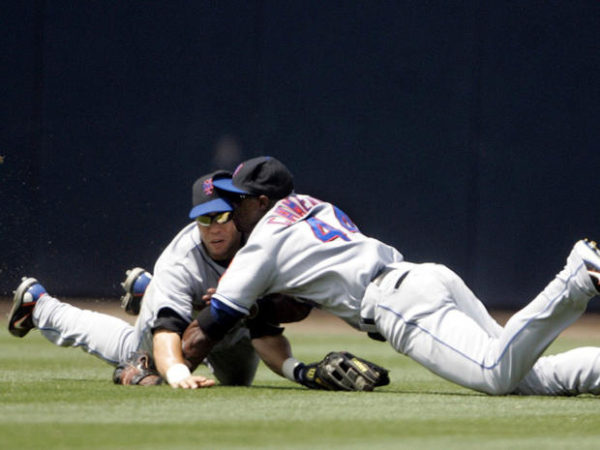
MMO: Do you feel that after that horrific injury you were the same type of ballplayer ever again?
Mike: I was different all the way around. The only reason why was at that time I was only 31 going into my 32-year, I felt like I was still at the top of my game as a center fielder [until] that injury. I wouldn’t be able to be the same player if I went back that next year to playing right field knowing what just transpired. I wouldn’t have been good so I just said I can’t do it no more, I can’t play right field under these circumstances once my body had kind of healed up, and they traded me.
They traded me to San Diego (for Xavier Nady). That was one of the best things that happened to me in the aftermath because it took me directly to the place where I got hurt. Getting hurt is one thing, but I could’ve died, I could’ve died, literally. The impact could’ve broken my neck.
I wasn’t supposed to play baseball anymore after that. With the stuff that happens with your eyes and everything, I wasn’t supposed to play baseball after that. I didn’t know that. I mean, I made it back from that and got traded to San Diego, out of all places, the same place where everything took place at.
I went back to center field and my gratitude for the game was even more intense. I even played on another crazy level like with recklessness because my gratitude for the game changed. I was like, I can’t take anything at all for granted. Just to see my BP jersey hanging in the locker, you know I wasn’t supposed to be coming back, man. I wasn’t supposed to come back and do this anymore, but internally I felt like I had to come back because I couldn’t let that be the last time I go out.
I’m so thankful for that. It took a while, but I finished 21st in the MVP ballot, we made it to the playoffs in San Diego, I won another Gold Glove back in center. I got instant relief of saying that it’s okay, you know, everything’s all right.
MMO: Was it peace of mind knowing you could go back out there and compete?
Mike: I was good anyway but the fact that my oldest sister passed that October, I got hurt in August and was going through that psychologically. Then my oldest sister, who had two young girls, passed away. She died from pulmonary embolism and psychologically I was screwed up for a while.
It took me a while to come back that year. It took me that whole almost a year and a half to heal. I played, but it took me a year and a half to heal.
I wasn’t fully healed until probably 2007. I played 2006 just with what I was going through. I didn’t even work out in the offseason, I didn’t do anything, I couldn’t do anything. I didn’t do anything [from] August, September, October, November, and December. January, I may have picked up a bat like two weeks before spring training, just to see what it felt like. It was a lot of healing for me.
I guess the timing was perfect that I went to a place like San Diego where there was not much pressure. It was 75 degrees and sunny out there every day. I lived on the beach so it was therapy for me. It wasn’t any hard feelings with Beltran or whatever else; sometimes that’s just the way the game is.
He played a lot deeper center field than I played, so it’s very hard for me to have a collision with someone in the outfield because I’m in total command when I play center field. I’m in all the way command and everyone understood what I was trying to do when I was playing the game out there. Even my infielders, I let everybody know what was taking place, I let everybody know. I didn’t want any misunderstandings.
Even in times when we knew we were going to be in pressurized situations, I wanted to be in control. That got me in a little bit of trouble when I played right field because we didn’t play off each other, our boundaries were off. I had to learn how to play where Beltran was playing. And I played right field in the minor leagues my first couple of years because when I came up to the big leagues you didn’t play your position because somebody was there, you had to wait your turn.
MMO: How long did it take you to grab hold of center?
Mike: About a year and a half, I just had to wait my turn. I learned other positions and my son kind of gripes about that today. They’ve had him playing right field and I tell him there’s nothing wrong with that, son. I said this is development. There’s nothing wrong with developing yourself in all areas because it’s going to come back to you. You’re not going to be able to do it, I mean, there aren’t many guys that can play center field in their late thirties, and I was able to do that. I played 150-155 games in center field.
MMO: You’re right. You start hearing from scouts how certain guys lose a step or two after a certain age.
Mike: Yeah, you’ve got all these metrics and everything else now.
MMO: Are you a fan of the new metrics and advanced stats in the game?
Mike: Some of them. I mean, the numbers don’t lie obviously. The numbers don’t tell the whole story and I think that’s what is happening to Andrew McCutchen now. The numbers have gouged him and everyone saying he can’t play. I think that’s gouged his game in center field, just because it doesn’t add up one year doesn’t mean you’re dead. There are some things you can improve on.
I remember one time they said that I couldn’t do this or whatever else it is and I’m like, Okay, I’ll just show you. It’s like, okay, you said I can’t do that, I learned to play shallow in center field because everyone was talking about how good Andruw Jones was at going back on the ball and this, that and the other. And I was like, S***, I can do that easily! I’m going to work on that in batting practice and I’ll be able to go back so I’m going to take away these singles.
I knew I could go back to the wall, partly because I played in Seattle where the ball hung up, so it’s kind of just understanding everything that kind of takes place.
I kind of engaged myself in every moment being on the field and trying to be engaged with the game. Sometimes it’s good and sometimes they were bad because I took it to heart. I tried to perfect as much as I possibly could at the craft and have my people feel really good about it who I played with.
MMO: Backtracking a bit, what about New York sold you when you were a free agent in the offseason of 2003?
Mike: I had already been on the West Coast pretty much my whole career. As I said, I couldn’t come to Atlanta because of my grandmother. I wanted to be around where she could see me every day. I wanted to come back closer to home since I couldn’t be in Seattle, I wanted to come back this way.
And New York, I saw their team and they had an opening and I checked out their minor leagues and knew they had Cliff [Floyd] who was a really good friend and remember they had just beat us in ’99 and they had some guys coming through [the system].
There was an opening in New York and it was the fact that I felt like since I played in Chicago, I got a few years under my belt, I can handle New York. I just played in Seattle where we were kind of the top team for three or four years, we just missed the playoffs those last two years because the Angels won 100 something games and the year before Oakland had won 100 some games, and we won 93 games.
I thought I was prepared. I played for Lou Piniella so that prepared me a little bit more. I could handle New York, I’m 30 something years old now. And it’s a chance to play in New York man! You play in New York, it’s special.
MMO: Did you enjoy New York? Do you have a favorite moment?
Mike: No doubt about it! It was hard, you know? My time in New York was well spent. I got a chance to engage in a lot of people, the atmosphere, everything else, and so that was special in itself.
Numbers-wise, it didn’t come out the way I wanted to. I ended up passing Tommie Agee with the home run deal. It was good, man, because I was around a lot of good players. [Mike] Piazza, [John] Franco, [Tom] Glavine, [Al] Leiter; at least two of them Hall of Famers. Learning from that aspect, and probably David Wright would’ve been a Hall of Famer too if he could’ve kept going.
MMO: I know you said you separated yourself from the game a little since retirement, but do you still keep up with all that’s going on in the game today?
Mike: Most definitely! When I said separated it was just trying to intertwine my life other than baseball. I’m fully engaged, this woman here [his wife] hates me right now. She hates it that I’m still so engaged and I said look, for half of my life that’s what it was, that was my life even before I knew your life.
MMO: Do you pay attention to the certain teams you played for or certain guys you played with?
Mike: [Laughs.] Everyone I played with is gone! Except for Ichiro, that’s it! He’s the only guy still playing.
MMO: You and Ichiro seemed to have a very close relationship and bond in Seattle. What kind of guy is Ichiro off the field?
Mike: We did! He’s a good man, he’s good people. He stays to himself. I went down to spring training and I saw him when I went to see my son and I told him that your young guys have to pay attention to you. There’s a reason why he’s playing at 43-years-old and still playing [at a high level].
I wish I had the chance to play with him longer, I should have but Bill Bavasi messed that up in Seattle.
I’m just grateful for being able to play with so many great players, I don’t know if anyone can say they played with so many great players that are Hall of Famers or potential Hall of Famers. Every team I played on I played with Hall of Famers. I played with Pedro [Martínez] in New York, Mike Piazza, Tom Glavine.
In Chicago I played with Frank Thomas, Tim Raines, I played with Robin Ventura, Harold Baines, Ozzie Guillen, Albert Belle, and pitching-wise Doug Drabek.
Cincinnatti with Greg Vaughn, Barry Larkin, and guys that were instrumental in teaching.
In Seattle: John Olerud, A-Rod, Edgar Martinez, Jay Buhner, Ichiro. In San Diego: Trevor Hoffman, Adrian Gonzalez was probably the next tier of guy I should say. Playing with David Wells, like all of these guys.
In Milwaukee, Prince Fielder and Ryan Braun, and Trevor Hoffman again. And then going from Milwaukee to Boston I was playing with Big Papi, Jon Lester, Adrian Beltre, Victor Martinez, Dustin Pedroia, Mikey Lowell. That nucleus just goes on and on and I’ve been fortunate to be a part of the game in that sense, and not only be able to see it, but watch it transpire like no other.
MMO: Do you have a favorite moment from your career?
Mike: So many because they’re all not really baseball-related or inclined. Obviously, the four-homer game was one thing but probably one of the biggest things that took place in my life was being mentioned in the sense of winning an award or being mentioned in the award for the Roberto Clemente Award by being in New York City.
MMO: I can’t thank you enough for some time today, Mike. It was great to talk with you!
Mike: Definitely, Mathew. Take care.
Follow Mike Cameron on Twitter @_darkman44


